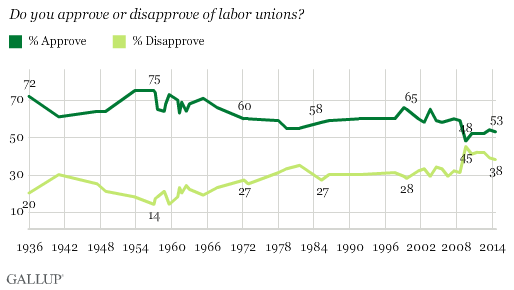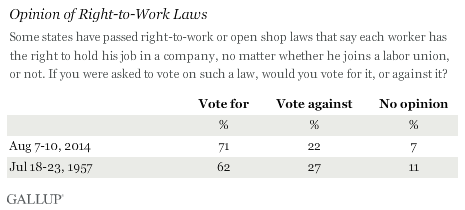PRINCETON, NJ -- A slim majority of Americans, 53%, approve of labor unions, although approval remains on the low end of Gallup's nearly 80-year trend on this question. Approval has been as high as 75% in the 1950s. Currently, 38% disapprove of unions.

At the same time Americans express greater approval than disapproval of unions, they widely support right-to-work laws. Those laws allow workers to hold jobs in unionized workplaces without joining a union. Currently, 10% of Americans identify as union members according to Gallup's Aug. 7-10 poll.
In an update of a question asked in 1957, 71% of Americans said they would "vote for" a right-to-work law if they had the opportunity to do so, while 22% said they would vote against such a law. That is a slightly higher level of support than Gallup measured nearly 60 years ago.

The popularity of right-to-work laws may be a result of Americans' greater agreement with a major argument put forth by right-to-work proponents than by one of the main arguments put forth by opponents of such laws. The poll finds 82% of Americans agreeing that "no American should be required to join any private organization, like a labor union, against his will," a position advanced by right-to-work proponents. Pro-union forces partly oppose right-to-work laws because of the "free-rider" problem, with non-union workers benefitting as much as union workers when unions negotiate pay and benefit increases with employers. But by 64% to 32%, Americans disagree that workers should "have to join and pay dues to give the union financial support" because "all workers share the gains won by the labor union."
Currently, 24 U.S. states have right-to-work laws in place, including Indiana and Michigan who passed theirs in 2012. The Indiana law's fate is uncertain given recent legal challenges to it. The states with right-to-work laws tend to be Republican-leaning states, mostly in the South, Mountain West, and Plains areas of the country. That is consistent with the preferences of rank-and-file Republicans nationally, who disapprove of unions by 57% to 32%, and support right-to-work laws by 74% to 18%. Democrats, meanwhile, overwhelmingly approve of labor unions. Interestingly, though, most Democrats favor right-to-work laws, and their support nearly matches that of Republicans.

Democrats' widespread approval of unions, and their support for right-to-work laws, appear at odds. It is possible they may be sympathetic to the concept of unions and what they stand for in theory, but may disagree with some of the specific policies unions favor that could interfere with the opportunities for non-union members to secure employment.
Gallup has a limited sample of union members in its poll, and the data suggest that they are divided in their views of right-to-work laws rather than being outright opposed to them.
Implications
Although Americans widely favor right-to-work laws, only about half of the states have passed such laws. The right-to-work debate is ongoing in states like Ohio and Wisconsin, and New Mexico and Kentucky may adopt those laws if Republicans win control of the legislatures in those states in the next election.
The evidence for whether right-to-work laws are a net positive or net negative to states is mixed. On the one hand, consistent with the arguments of proponents, right-to-work states do appear to attract more business than states without such laws. On the other hand, consistent with the arguments of proponents, workers in right-to-work states appear to be worse off in terms of pay and benefits than workers in other states.
It is clear that whether a state has a right-to-work law in place is a reflection of the politics surrounding labor unions, with Democrats showing much greater support for labor unions than Republicans. Political leaders in states that tend to be politically Democratic and where Democrats are currently in power are unlikely to pursue laws strongly opposed by unions. Most Republican-leaning states already have such laws in place, consistent with Republicans' more anti-union stance. States that are more competitive politically may enact right-to-work laws if Republicans can win party control of the state government, as occurred in Michigan and may happen in Kentucky and New Mexico.
Americans, though, are clearly less supportive of labor unions, and somewhat more supportive of right-to-work laws, than in the past. Union membership is also on the decline, which in turn makes unions less of a political force than they used to be. If these trends continue, more states could adopt right-to-work laws in the future.
Survey Methods
Results for this Gallup poll are based on telephone interviews conducted Aug. 7-10, 2014, with a random sample of 1,032 adults, aged 18 and older, living in all 50 U.S. states and the District of Columbia.
For results based on the total sample of national adults, the margin of sampling error is ±4 percentage points at the 95% confidence level.
Interviews are conducted with respondents on landline telephones and cellular phones, with interviews conducted in Spanish for respondents who are primarily Spanish-speaking. Each sample of national adults includes a minimum quota of 50% cellphone respondents and 50% landline respondents, with additional minimum quotas by time zone within region. Landline and cellular telephone numbers are selected using random-digit-dial methods. Landline respondents are chosen at random within each household on the basis of which member had the most recent birthday.
Samples are weighted to correct for unequal selection probability, nonresponse, and double coverage of landline and cell users in the two sampling frames. They are also weighted to match the national demographics of gender, age, race, Hispanic ethnicity, education, region, population density, and phone status (cellphone only/landline only/both, and cellphone mostly). Demographic weighting targets are based on the most recent Current Population Survey figures for the aged 18 and older U.S. population. Phone status targets are based on the most recent National Health Interview Survey. Population density targets are based on the most recent U.S. census. All reported margins of sampling error include the computed design effects for weighting.
In addition to sampling error, question wording and practical difficulties in conducting surveys can introduce error or bias into the findings of public opinion polls.
View survey methodology, complete question responses, and trends.
For more details on Gallup's polling methodology, visit www.gallup.com.
